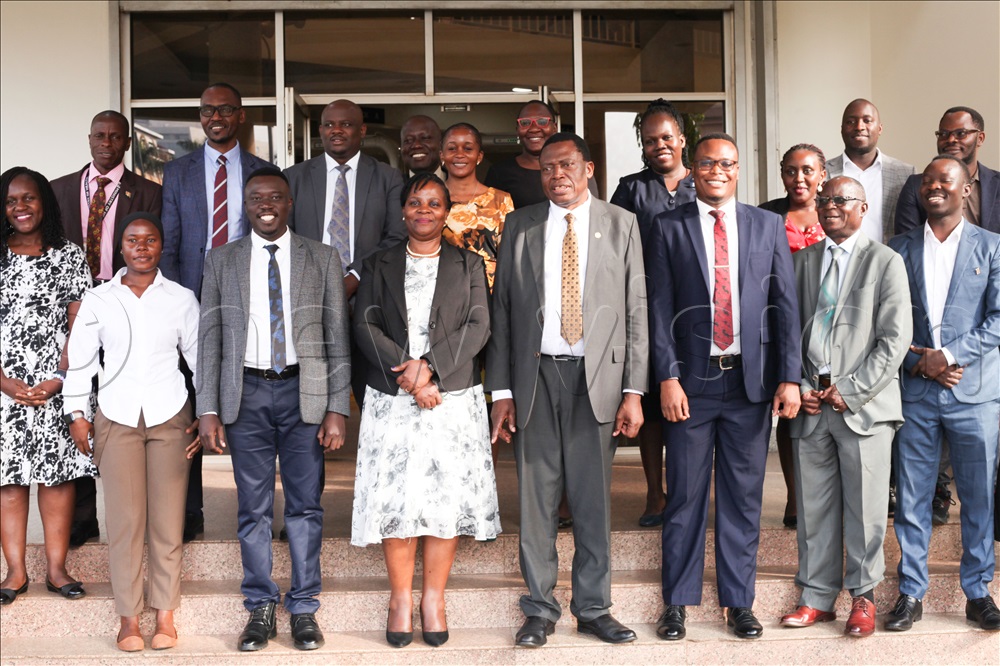Govt launches free reading glasses initiative to combat vision loss
The Ministry received 25,000 and 16,200 pairs of reading glasses from Evidence Action and CHAI, respectively. These will be distributed through government health facilities in Bukedi and Busoga sub-regions.
Joy Batuusa, CHAI’s Country Director pose for a photo with Dr Charles Olaro, Director General of Health Services as she hands over boxes of glasses. (Photos by John Musenze)
________________
The Government of Uganda, through the Ministry of Health, has launched a six-month pilot project to provide free reading glasses to thousands of individuals in need, aiming to improve eye health and support middle-aged and older Ugandans experiencing near vision challenges.
The program, officially launched on July 29, 2025, at the Ministry headquarters in Wandegeya, Kampala, is being implemented in partnership with Evidence Action and the Clinton Health Access Initiative (CHAI), targeting individuals aged 40 and above affected by presbyopia—an age-related condition that reduces the eye's ability to focus on close objects.
Receiving the donation on behalf of the Ministry of Health, Dr Charles Olaro, Director General of Health Services, hailed the initiative as timely and transformative.
The Ministry received 25,000 and 16,200 pairs of reading glasses from Evidence Action and CHAI, respectively. These will be distributed through government health facilities in Bukedi and Busoga sub-regions.
“This support comes at a crucial time as we strengthen our rehabilitation and assistive technology services to ensure inclusivity and improved quality of life for all Ugandans,” said Dr Olaro.
“These glasses should go to people who genuinely need them—not just for curiosity.”
Ministry of Health officials and Partners pose for a photo after the handover of the boxes of glasses.
He explained that improved vision helps people regain independence in daily tasks such as reading, sewing, cooking, sorting grain, and counting money—thus enhancing their productivity and dignity.
Dr Olaro also urged health workers and local leaders to raise awareness, especially in rural communities where vision services are often unavailable.
“Let us mobilise people in deep villages who might not know these services exist. This is just the beginning, and one will be required to pay only sh4,000 to access a pair of glasses,” he added.
Globally, presbyopia affects approximately 1.8 billion people. Though inevitable with age, the condition can be easily corrected with affordable reading glasses.
Support from Evidence Action and CHAI
Evidence Action, a non-governmental organisation supporting the implementation, has committed US$36,000 to screen and distribute reading glasses to 25,000 individuals in Mbale and Budaka districts.
“One in six Ugandans over the age of 40 suffers from near vision impairment,” said Richard Kibuuka, Country Director of Evidence Action Uganda.
“As an organisation committed to cost-effective, evidence-based poverty solutions, we saw an urgent need to act. Research shows that access to reading glasses can increase income by up to 33% for people in vision-intensive jobs.”
He noted that the pilot will test two delivery models—community health worker outreach and targeted community clinics—to identify the most effective way to deliver vision care at scale.
The Clinton Health Access Initiative has also bolstered the campaign with a donation of 16,200 reading glasses. According to CHAI Uganda Country Director Joy Batuusa, this marks the organisation’s first major venture into eye health in Uganda.
“We realised that vision impairment is one of the most common yet most easily addressed disabilities,” Batuusa said.
“Uganda now has a national strategy on assistive technology, developed jointly with the Ministry of Health, to streamline the importation and distribution of vital assistive devices like these glasses.”
She explained that the new strategy provides the policy framework and operational guidelines needed to ensure long-term sustainability of such interventions.
According to the Ministry of Health, the initiative is not just about vision—it is part of a larger public health approach to disability inclusion and productivity through assistive technology.
“These devices will directly benefit persons with disabilities, especially those aged 40 and above living with presbyopia or mild near vision loss,” Dr Olaro reiterated.
“They will help people engage in daily tasks like reading, writing, sewing, cooking, or counting money—ultimately improving their independence and contribution to the economy.”
If successful, the program could expand to other districts, offering a scalable and cost-effective model for eye care services in Uganda and potentially influencing similar initiatives across the region.